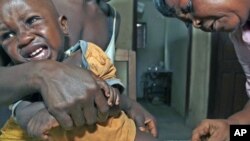The Global Alliance for Vaccines and Immunization [GAVI] says millions of children in developing countries will not die because major drug companies have agreed to drastically cut the price of life-saving vaccines. GAVI has announced this important new initiative.
The United Nations estimates 8 million children around the world die before their fifth birthday. About 1.7 million of them die from diseases that are preventable by vaccines.
GAVI spokesman Jeffrey Rowland said that one child dies every 20 seconds because he or she did not receive a life-saving shot in the arm or the leg.
“GAVI’s goal over the next five years, by 2015, is to immunize millions more children and save an additional four million children’s lives, purely by providing basic vaccines against diseases that are… almost non-existent in rich countries, as well as providing new vaccines against pneumonia, diarrheal diseases and then hopefully HPV [Human Papillomavirus] and some other vaccine-preventable diseases,” he said.
Rowland said GAVI now has a fair chance of achieving this goal because a number of vaccine manufacturers in emerging countries and in the West have agreed to drastically cut prices of life-saving vaccines to developing countries.
Companies including GlaxoSmithKline, Merck, Johnson and Johnson, and Sanofi-Aventis will, in some instances, reduce prices by as much as two-thirds to poor countries.
Rowland said the India-based firms Serum Institute and Panacea Biotec will provide reductions on vaccines that protect children against five potential killers. These include diphtheria, tetanus, pertussis, hepatitis B, and Haemophilus influenzae type b.
He said other companies, including GlaxoSmithKline and Merck will provide low-priced vaccines to protect children against rotavirus, the leading cause of severe diarrhea. It kills about half a million children annually.
“Almost all children in the world get rotavirus," said Rowland. "The thing is, that in the United States or in Europe, children usually have good access to medical care - so re-hydration, antibiotics, hospitalization. Children in poor countries, on the other hand, usually do not. So, by the time a mother brings her child to a clinic after having diarrhea, that child is near death. And, oftentimes the antibiotics and the services are not available to save the child’s life.”
A rotavirus vaccine in the United States can cost as much as $50. Under the lower pricing scheme, this same vaccine purchased in a developing country could now cost about $2.50.
More than 90 percent of cervical cancer deaths occur in developing countries. It kills 200,000 women each year. Rowland said women in poor countries who get this terrible disease face a brighter future.
He said Merck will offer GAVI the HPV vaccine at a reduced price of $5 a dose - a 67 percent reduction from the current price.
GAVI hopes to raise $3.7 billion at a pledging conference next week. Rowland said that given the lower prices for vaccines, this money will allow the organization to fund the immunization of almost a quarter of a billion extra children by 2015.
Drug Companies Cut Prices of Vaccines for Poor Countries
- By Lisa Schlein




